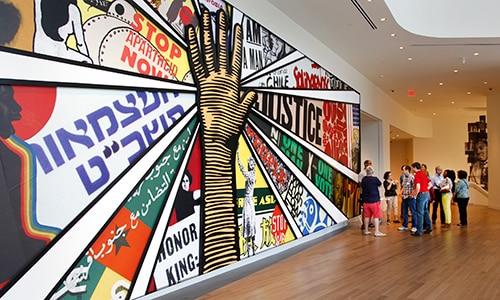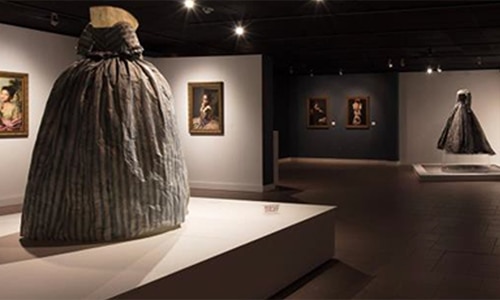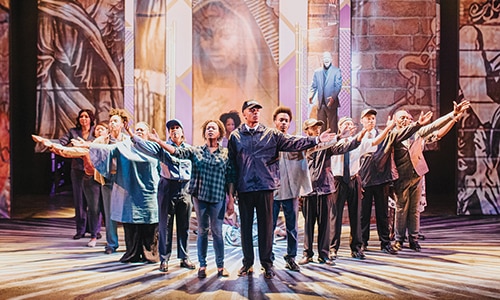
Each year, the nation takes the month of February to reflect on the endless contributions and achievements of African Americans. PNC also celebrates Black History Month, but its support for Black communities, organizations and individuals extends far beyond the month.
“Diversity, equity and inclusion is part of the fabric of PNC,” says Richard Bynum, chief corporate responsibility officer. “It has long been at the heart of how we run our business and has guided our efforts around economic empowerment.”
PNC’s relationships with national and neighborhood organizations represent just one example of how the bank supports the preservation of Black history, while also providing invaluable education and hope for brighter futures.
A few of the premiere PNC-supported community treasures shared their stories of how they are working to keep Black history and culture accessible to all.
Atlanta, National Center for Civil and Human Rights
PNC’s relationship with the National Center for Civil and Human Rights (NCCHR) traces back to 2013 when the bank’s Tax Credit Solutions team allocated $11 million in New Markets Tax Credits to help finance the Center’s construction.

Over the years, PNC has supported the museum and human rights educational institution by sponsoring programs that create dynamic and empathy-building experiences that also teach about history’s connection to the present.
Atlanta, a city steeped in civil rights history and the birthplace of Rev. Martin Luther King, Jr., is home to the center, which connects the U.S. civil rights movement of the 1950s and 1960s to global human rights movements for people of color, women, immigrants, those with disabilities, LGBTQ+ people and other marginalized communities.
“We are excited to welcome visitors to celebrate and reflect on this history of bravery and resistance,” says Jill Savitt, NCCHR president and CEO. “Black History Month is an ideal time to look back at the lives and examples of iconic and unsung activists for strength and insight as we confront persistent modern oppression.”
More recent Black history and heritage programming has included a timeline activity for children and families and a mural creation of the late civil rights legend and longtime congressman Rep. John Lewis (D-Georgia). Musical and dance performances and a conversation with civil rights activist Ambassador Andrew Young also have been a part of events celebrating Black history and heritage at the center. Young, also a former Atlanta mayor, served as a leader of the Southern Christian Leadership Conference and marched with MLK during the 1950s and 1960s.
“We are grateful to the PNC Foundation for providing support and resources to enrich our programs to inspire folks on all different levels and walks of life to engage in thoughtful conversations about race, equity and justice,” Savitt says.
Chicago, DuSable Black History Museum and Education Center
PNC and the DuSable Museum of African American History, the oldest independent African American history museum in the nation, have maintained a relationship that spotlights the richness of Black history and culture.
One of the museum’s key tenets is to treat every month as Black History Month, encouraging an unlimited curiosity that pushes the significance of Black history year-round.

Over the years PNC has supported celebrations of Black history and heritage through educational programs and exhibits.
DuSable Museum President and CEO Perri Irmer believes education can help with the lack of empathy that is sometimes still displayed regarding the historical impact on Black lives.
“It’s important to understand that Black history is not only American history, but world history,” Irmer says. “Black lives and Black experiences are integral to understanding the world we live in today and deserve to be more than a footnote in history. The work we do here corrects centuries of misinformation and minimization. We are expanding on incomplete curriculums and reclaiming the narrative to make our history more accurate and more accessible.”
To provide that education, the DuSable Museum offers tours, webcasts, learning opportunities and performances to ensure important stories are still being told.
PNC has helped enrich thought-provoking, socially relevant experiences for visitors of all ages, through more than $500,000 in philanthropic contributions to the museum as well as through advocacy, including support for “The March” a virtual remake of Martin Luther King, Jr.’s 1963 March on Washington for jobs and freedom.
“The history of Black lives and the history of the world are inseparable,” Irmer says. “You can’t unweave the cloth. You can’t tell one story without the other.”
Cleveland, Karamu House
For almost 106 years, Karamu House has supported the local community by activating its mission to produce professional theater, provide arts education and present community programs for all people while honoring the African American experience.
America’s oldest-producing Black theater, which was originally founded as a settlement house, is a community institution serving as a common ground for people of different racial, religious and socioeconomic backgrounds.

PNC continues to show support for Karamu House and has sponsored theatre series, arts education programs and annual fundraising events that help Karamu further its mission in the community.
Tony F. Sias, president and CEO of Karamu House, also believes the African American experience is often misunderstood or left out of history entirely.
He says the PNC relationship gives Karamu the ability to serve more individuals in the community and to reach larger audiences for greater impact.
“When we understand who has been left out of the conversation and the consequences of their exclusion, we can draw a straight line toward solutions to include them moving forward. Thus, the preservation of true history advances racial equity for all,” Sias says.
Greater Washington, National Museum of African American History and Culture
In 2019, PNC donated $1 million to the National Museum of African American History and Culture (NMAAHC), a Smithsonian Institution museum that explores American history through the lens of the African American experience. The donation is designed to cover operational costs over five years, but for PNC, the partnership is much more meaningful.

“Given the relatively short life of the museum, its presence and reach are setting a new standard for meeting the deep demand to reconcile American history with the realities that have faced the American people," says Bynum, who also serves on the corporate council for the museum.
NMAAHC’s Talking about Race initiative, a portal dedicated to providing tools and guidance to inspire conversations about race, gives parents, educators and others a foundation to learn, reflect and move forward.
The museum also has been documenting the marches and rallies that have shaped the country’s discourse around racial justice, leading courageous conversations through virtual summits and placing historic election years in the greater context of the struggle for voting rights and political representation.
Creating a better future through education
Bynum believes the museums and community institutions that PNC supports provide a lens to evaluate issues that will shape or inform the future – a future that has long been a focus for PNC employees, the communities it serves and shareholders.
“Whatever your background, whatever your ethnicity, this is an American story about people who have persevered through trials and hardships and whose story has become, in many cases, the culture of America," says Bynum.
Read More
Black History & Heritage
Learn how PNC celebrates historical Black achievements and culture.



